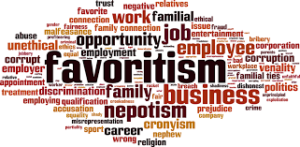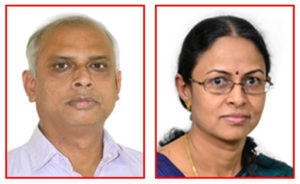Favoritism, Opportunities and Recognition will have an impact on mental health. This article is trying to shed some lights on how an individual when facing favoritism can maintain his/her mental health and survive?


In India nepotism is generally accepted:
In countries such as India and China, nepotism is generally accepted. In Western culture, nepotism or cronyism have strong negative connotations, particularly if the recipient of the favors is unqualified for it. What is the reason that in a country like India, we are more accepting of nepotism and cronyism? And what problems does it bring about. Probably our history of being a caste based society has something to do with our higher tolerance for nepotism and cronyism, where loyalty to one’s family and caste took priority over other professional roles and relationships. But nepotism and cronyism in modern society, take on a very insidious nature when it assumes forms of a deliberate bias or victimization. This happens when those in positions of power, authority or influence use it to target a particular person or group of people by denying them opportunities or prevent them from having access to it.
We are not focusing on businesses where generation after generation the business will be handed over to the offspring. But the focus is on the jobs where on the basis of competency employees are recruited or on the jobs where competency-based opportunities and recognition is expected. These are two words we would like to insists on “opportunity” and “recognition”. When an organization says we have a good culture then they need prove that whether they are providing equal opportunity to all its employees and prove that they are recognizing the employees equally on the basis of their performance.
This is what is missing in the recent incident in the Bollywood. Opportunities have been rejected or taken away and recognition was not provided. Rather we could say discriminated on the basis of “outsider” and “coming from — place” and “coming from TV” etc. When we speak about discrimination we need to understand certain jargons here. They are “conscious bias and unconscious bias”. Conscious bias are negative behaviors through which trying to hurt the other person. It could be subtle too for example: ignoring the person in the team meeting, ignoring the suggestions provided by the person in the team meetings and not acknowledging the person at times seeing through the person these are some of the subtle forms of conscious bias. Through this psychologically hurting the other person. The individual who is practicing this is very well aware of this attitude of his / hers.


On the other hand, unconscious biases are stereotypes formed outside their conscious mind. Most of the time we tend to learn this automatically from our family, community and from the society.Apart from these the in group and out group bias otherwise known as in group favoritism is a pattern of favoring members from his /her own group. This could be expressed in terms of providing opportunities and recognition to the members of the group. If you are the member you will get the opportunity and you will get the recognition. If you are not a member then you need to struggle hard to prove yourself but still you won’t be given the needed recognition. Rather you would be ignored and sidelined.
How an individual when facing favoritism can maintain his/her mental health and survive?
Let us understand the different terms commonly used when speaking about favoritism? Favoritism is favoring someone not because the person is good in that job but because the person may be a relative, may be a friend or may be due to some other reasons beyond their job performance. Simply we can say is partiality in the treatments. When we speak about favoritism there are two common terms keeps popping up. They are “nepotism” and “cronyism”. The difference between these two terms are like this: nepotism is partiality to family members and cronyism refers to partiality to a friend or known person. The term nepotism originated from Italian word “nepotismo” meaning nephew.
Discrimination in the workplace one of the common issues which is cropping up faster like a disease. At times discrimination happens because of unconscious bias and most of the times consciously. But as discussed already, such biases exist not just in Bollywood, but in different organized aspect of our social institutions – political, social, economic organizations, including the so called professionally run corporations. Living with and overcoming such targeted biases may be a difficult challenge for victims who are the target of such motivated attacks by the collusive group of powers that be.
Before we proceed to discuss how to deal with nepotism and cronyism, when you are a victim of it, it is important to recognize the manifestation of nepotism and cronyism in workplaces. Nepotism, cronyism and favoritism, easily penetrate and corrupt decisions and practices at workplaces. And these practices are hard to control, in a culture such as ours where high value is placed on interpersonal relationships. Practices of nepotism, cronyism and favoritism have severe negative outcomes in workplaces, as people are chosen for positions based on blood relationship or friendships.
Performance of these candidates may not be as good when compared to qualified candidates. Also keeping such unqualified candidates in these positions will undermine workplace fairness, motivation and harmony, while bringing in inefficiency and lack of focus on training and development activities. In the Thirukural, a manual for governments and corporations, Valluvar denounces nepotism and favouritism thus – “If you choose an unfit person for your job just because you love and you like him, he will lead you to endless follies.” According to Valluvar nepotism is both evil and unwise. Nepotism and cronyism damage the exact social relationships in the organization that foster a fair, humane and tolerable workplace.
Favoritism whether nepotism or cronyism results in negativity in the workplace. Some of the drawbacks associated with nepotism, cronyism and favoritism that impact organizational performance are:
1. It lowers the morale of the employees. No business will survive well when its workforce is having a negative morale. If it is not been addressed at the nib the business may lose its competent employee. Eventually the action of one or two person who follow favoritism results in the stunted growth of the organization.
2. Employees will feel that they need to be related to or have a friend at a high position in the organization. So instead of focusing on work, much efforts will be expended on cultivating such relationships.
3. Managers and supervisors may be afraid or uncomfortable with the presence of subordinates who have close personal ties to high-level executives.
4. Employees will view that they will be promoted or rewarded on based on relationships or friendships in the organization.Also, even the competent employee will always be confused if they are holding their positions because of their talent or ties with the high-level executives.
5. Executives will be more interested in keeping their friends and acquaintances in good positions than they would be in supporting employee performance that supports organizational performance.


So as an individual, how does one manage, when he or she is victim of targeted bias, nepotism, cronyism or favoritism? If you find yourself in a place rife with these practices you could try the following approaches:
1. Focus on maintaining a professional attitude and strong performance. The last thing you want is your employer to think that he / she is better off hiring a friend or a relative as the performance is really making no difference in either case. Also, be aware that the person who is the receiver of favor may get away with unprofessional attitude, but you may not be able to. It is not fair that you are a victim of nepotism, but any provocative behavior on your part may make the situation very toxic.
2. Resist the urge to act out, gossip with coworkers or slack on the job. What you say may come back later to haunt you. If at all you feel the need to speak about it, do it with your family or best friend who is not connected to the workplace or with your therapist.
3. The most frustrating aspect of nepotism is that you feel overlooked as opportunities you deserve are given to someone less qualified. Your best bet is to document your performance and make a conversation of it with your higher ups, rather than making an issue of the underserved opportunities another person has received.
4. If you are looking to report on nepotism or any form of favoritism, please remember that it is a dangerous territory, and you need to proceed with caution and be careful about whom you report to. Your best bet is to identify a third-party ally, who is higher up in the organization, with more power but no personal interest in the game. But as with any complaint, witnesses and documentation would be important. Also, if you wish to speak up, please remember that this may invite closer examination of your own behavior and performance.
5. Dealing with nepotism can be very stressful. And it is never going to vanish overnight. Keeping patience is very important and more important is to find activities that can take your attention away from it. Be it going for a walk, chatting up with your friends, watching a favorite show or talking to supportive friends and family – keep doing this as these will help you to better cope with the situation. Also, do accept that nepotism is everywhere – in some cases it can hinder your professional growth, but that may not be the case in all situations. Preferably approach the nepotism conversation with what you have observed and not what you have experienced.
6.The next important activity is self reflection. Mindfulness practices will bring in lot of changes in the emotional state of the affected individual.
7. Most of the times the extreme steps by the newer generation is because of bottling up everything in the mind and suffering silently. The general belief of generation “Z” is like this that showing their weakness / vulnerability is not good. To maintain this belief, they tend to pretend as if they are strong and macho to the outside world. But in their own cocoon they tend to cry in silence and suffer in their own hell. Seeking support from a counselor / psychologist is not a taboo anymore.
8. If all the above is not helping … then they can try for other jobs but in the next job also there may be chances of people having these biases. So, we won’t suggest this as an option at all because this is not based on rational thinking rather on an emotional basis.
Now to the other question – how can organizations negate workplace nepotism? It is a difficult task but not an unmanageable one.
1. Anti-nepotism policy: Create anti-nepotism policies that restrict related individuals from working in the same place. For example it could be guidelines that prevent one relative from supervising another or married couples working in the same team. A well define anti-nepotism policy should allow for employment of friends and relatives while preventing the associated operational issues that may arise.
2. Communication channel: Organizations could be committing nepotism without realizing it. The best way to avoid it is to provide communication channels that allow employees to register any concerns that are resulting due to nepotism. This provides for opportunities to employees to report any cases of nepotism or favoritism in a polite and diligent manner.
3. Training program can be offered to leaders, managers and supervisors on the nature and impact of these practices and responsible prevention of it.
We would like to end with a quote “your value doesn’t decrease with someone’s inability to see your worth”.


Prof. Dr.Sathiyaseelan B-School of Business & Management
Prof. Dr.Anuradha Sathiyaseelan-Department of Psychology
CHRIST ( Deemed to be) University,Bengaluru– 560029
Ph: 080 40129685 Mob: +91 9535007186
Email: sathiyaseelan.b@christuniversity.in
anuradha.sathiyaseelan@christuniversity.in
anuradhasathiyaseelan@gmail.com











